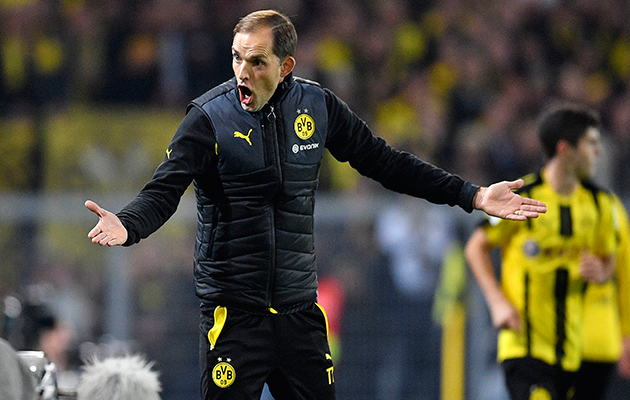The decision to reschedule the Dortmund-Monaco Champions League quarter-final first leg less than 24 hours after a bomb attack on the Ruhr club’s bus has sparked quite a debate in Germany.
Should “The Show Must Go On” concept always be respected? Do players deserve a time-out in moments of danger and stress? How easy is it to forget that sportsmen are human beings too?
Defeated 3-2 in the hastily-rearranged tie at the Westfalenstadion, the Dortmunder clearly were not totally focused on the job in hand. And given the gravity of the situation – defender Marc Bartra fracturing a wrist in the incident and many of the squad in shock – who could blame them? If ever there was a moment to jump off the treadmill and reflect, this was it.
Schwarz-Gelben coach Thomas Tuchel certainly was of the opinion that a little more compassion from UEFA would have been welcome, saying: “This gives you the feeling of impotence, that we have to keep functioning and nothing else matters.” Among the Bundesliga coaching fraternity, many echoed those sentiments.
Young Hoffenheim boss, Julian Nagelsmann, described the decision to play the tie the following day as “more than unfortunate”, correctly identifying the “immense business interests” involved, while Hertha Berlin ‘Trainer’ Niko Kovac, was equally critical of the non-stop demands of elite sport in the 21st century.
“It’s a paradox when footballers no longer have the time to deal with situations as people,” declared Kovac. “It never stops. It’s always a case of ever higher, ever quicker.”
In fairness to UEFA, they were in an organisational bind. The return leg of the quarter-finals was only a week away and the Dortmund calendar for April already was jam-packed with European, Bundesliga and DfB Cup commitments.
Other respected German football figures thought the authorities made the right call, arguing that the terrorists must not be seen to win, Bayern Munich chairman, Karl-Heinz Rummenigge spoke of “never bowing to violence”. Freiburg coach Christian Streich took a similar line: “Maybe there’s a bigger mission here for Dortmund than a possible semi-final. Sending a message to those who want to blow people up can take precedence over results on the sports field.”
In an interview with the Frankfurter Allgemeine newspaper, former German federation security chief Helmut Spahn also put the moral case for immediate return to normal service. “These attacks are against us, our freedom, our society. If we cave in, we’re doing exactly what the criminals want.
“However, you always have to weigh up the pros and cons. If there’d been deaths, the game would not have gone on. Football is paying a price for its huge popularity. For terrorists and criminals it’s a target.”
What We Learned This Week
1. Happy Easter at Hoffenheim
Still undefeated at home in 2016-17, Hoffenheim took another step towards Champions League qualification with a sensational display of attacking power in their 5-3 win over Borussia Monchengladbach on Saturday. The first Bundesliga game this year to feature four goals the first half, the match was an end-to-end thriller and no one contributed more to the excitement than Hoffenheim striker, Adam Szalai, who in a rare start, scored twice and combined superbly up front with the ever-combative Sandro Wagner. The Hungarian international Szalai is worth his weight in part-time gold. Although only on the pitch for 519 minutes this season, he has scored seven times. The best strike-rate in the Bundesliga.
2. Down but not yet out
The Easter weekend proved to be the perfect environment for relegation resistance. For much-needed triumphs down in the Bundesliga cellar. Winless in their previous six games, Augsburg’s 2-1 victory over Cologne will have gone a long way to repairing the former’s crumbling morale, while Wolfsburg – who dismantled fellow strugglers Ingolstadt 3-0 – and Mainz – who saw off Hertha Berlin 1-0 – also managed to steady their nerves. It’s been a good week for Mainz boss Martin Schmidt; given a vote of confidence by the club board, celebrating his 50th birthday and picking up three vital points.







